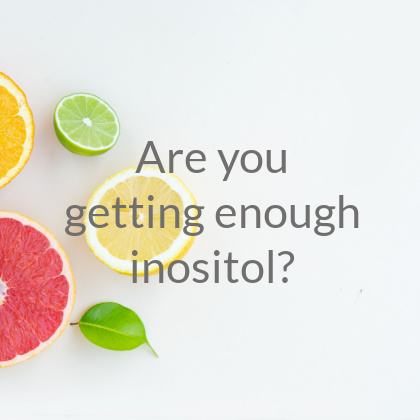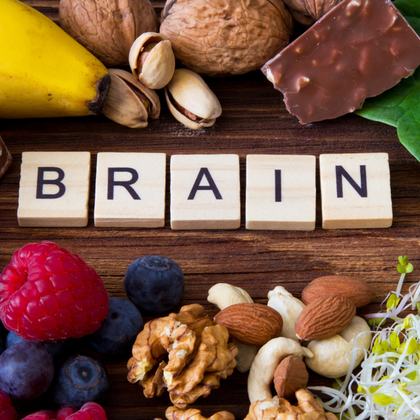
It may not be as popular as some other dietary substances, but choline – just like omega-3 fatty acids – is an essential nutrient. This means you need it for normal body functions and that all (or most) of it has to be supplied by the foods you eat.
What is choline?
If you don’t know that much about choline, it could be because it was only officially recognised as an essential nutrient in 1998 (i). It used to be known as vitamin B4, but it’s not technically a vitamin, rather a vitamin-like nutrient. But because it shares certain similarities with the B vitamins in how it affects the body, choline is often grouped with them and is included in many B complex supplements.
What does choline do for the body?
So what exactly does choline do and why do you need it? Your brain and nervous system need choline to regulate memory, mood, muscle control and other bodily functions. All of the cells in your body also need choline to keep the membranes that surround them strong and healthy. But because choline is still a relatively recently recognised essential nutrient, scientists haven’t yet discovered everything about how it affects human health. Here are some of the things we know so far:
Choline and heart health
Your body needs choline to break down a substance called homocysteine. In fact the European Food Safety Authority – EFSA – confirms choline contributes to normal homocysteine metabolism (ii).
Your body makes homocysteine naturally when you eat and digest foods that contain protein. But if your homocysteine level is too high you could have a higher-than-normal risk of developing heart disease (we don’t really know why but it could have something to do with atherosclerosis, which is when your arteries start to harden). Choline is believed to help support your heart by reducing your homocysteine level – plus it could also help lower your blood pressure (iii).
Choline and liver health
Another health claim upheld by the EFSA for choline is that it’s needed for normal liver function. If you don’t get enough choline in your diet you’re more likely than normal to develop nonalcoholic fatty liver disease – that is, liver disease not caused by drinking excessive amounts of alcohol. NAFLD isn’t uncommon, especially among people who are overweight or obese: according to the British Liver Trust, one in three of the 63 percent of adults in the UK who are overweight or obese has early-stage NAFLD (iv).
Can choline reverse fatty liver disease?
If you have NAFLD it means fat has built up in your liver. But while it isn’t usually considered harmful during the early stage, NAFLD can lead to more serious conditions including liver failure and liver cancer. Making sure you have an adequate intake of choline could help keep your liver healthy and prevent NAFLD.
Choline and brain health
Choline is converted into a substance called acetylcholine, which is important for brain health and development as it plays a role in memory and thinking (the EFSA confirms choline maintains normal neurological and cognitive function as well brain and neurological development (ii)). Admittedly more research is needed on the subject, but one study has found older people with high choline levels have better cognitive functioning – thinking, learning, communication, memory etc – than those who are low on choline (v).
Experts have also linked choline to other benefits including a reduced risk of neural tube defects (birth defects such as spina bifida) (vi), lower levels of inflammation (vii) and a low breast cancer risk (viii), though more studies are needed to confirm the results of their investigations.
Can your body produce choline?
Your liver does make a small amount of choline but not enough for all your body’s needs. This is why you need choline in your diet. But because there’s not enough information on how much choline we need, we don’t currently have a recommended daily amount or nutrient reference value to help us work out whether or not we’re getting all the choline we need.
How much choline should you take?
So are you getting enough? There aren’t any specific figures that show how much choline is found in the average British diet. But some experts are worried some of us aren’t even meeting the basic AI recommendations (x). Certainly if you’re a vegan or eat mainly plant-based foods you may be missing out, since the foods with the highest amounts of choline are animal-derived (some plant foods contain choline but in much smaller amounts). We do, have a measurement called adequate intakes (AIs) for choline, which are the minimum amounts we need to prevent liver damage. The EFSA has calculated the following daily AIs for choline (ix):
-
Adults and teenagers aged 15+ need 400mg
-
Children aged 1 - 14 years need 140 - 340mg
-
Babies aged seven to 11 months need 160mg
-
Pregnant women need 480mg
-
Breastfeeding women need 520mg
Which food is highest in choline?
To give you an idea of where you can get your daily dose of choline through your diet, here are some of the main foods you can find it in:
-
Liver (beef liver is by far one of the richest sources with the equivalent of your daily AI of choline in one 100g serving)
-
Eggs (the choline is found in the yolk)
-
Beef
-
Chicken breast
-
Fish (salmon, cod and other varieties of white fish contain the highest levels)
-
Dairy foods such as milk and yoghurt
-
Soya (eg soya/edamame beans, soya milk and tofu)
-
Potatoes
-
Cruciferous vegetables (in fact most green vegetables contain choline, with broccoli and sprouts among the richest cruciferous sources)
-
Pumpkin and sunflower seeds
-
Beans
-
Quinoa
-
Shiitake mushrooms
-
Peanuts and peanut butter
Choline is found in supplements too, including B complex supplements and lecithin granules. The amount of choline found in supplements typically ranges from 10mg to 100mg or higher, plus there are different forms too, including choline bitartrate, choline chloride and phosphatidylcholine (this is the form of choline found naturally in lecithin granules). But we don’t know which form of choline is the best, as there haven’t been any studies that compare how well the various forms are absorbed and used by the body.
Choline deficiency
Choline is an often overlooked nutrient, yet its importance for health is significant. Despite this, it’s quite possible that many of us aren’t getting an adequate intake from our diets, let alone an amount that would support optimum health – especially those of us who are now getting most of our food from plant ingredients.
We don’t have figures or estimates for the UK, but according to the National Institutes of Health most people in the US are getting less than the recommended daily AI of choline in their diets (xi) (the NIH also estimates that up to 95 percent of pregnant women have choline intakes that are lower than the AI (xii)).
What are the symptoms of a choline deficiency?
Despite the estimated low intakes of choline, choline deficiency is surprisingly uncommon. This is possibly because the body makes some – though admittedly not very much – choline itself. Someone who is deficient in choline, however, may not realise it until they’re diagnosed with muscle or liver damage, or until they develop NAFLD.
Can you take too much choline?
There are risks associated with having a very high intake of choline, including nausea and/or vomiting, excessive sweating, a fishy body smell, low blood pressure and liver damage.
Choline supplements
You can get choline from supplements as well as your diet, such as in B complex supplements and lecithin granules. The amount of choline found in supplements typically ranges from 10mg to 100mg or higher, plus there are different forms too, including choline bitartrate, choline chloride and phosphatidylcholine (this is the form of choline found naturally in lecithin granules). But we don’t know which form of choline is the best, as there haven’t been any studies that compare how well the various forms are absorbed and used by the body.
Find out more
If you suspect you could be running low on choline, choosing more healthy foods that contain choline and/or taking a choline-based supplement may help redress the balance. If you are concerned, you can click through to learn more about building a balanced diet for heart and eye health, or speak to one of our experts for free nutrition advice.
References:
-
Available online: https://academic.oup.com/nutritionreviews/article/67/11/615/1850648
-
Available online: https://www.efsa.europa.eu/en/efsajournal/pub/2056
-
Available online: https://www.hsph.harvard.edu/nutritionsource/choline/
-
Available online: https://britishlivertrust.org.uk/about-us/media-centre/statistics/
-
Nurk E. et al., Plasma free choline, betaine and cognitive performance: the Hordaland Health Study. Br J Nutr. 2013 Feb 14;109(3):511-9. Available online: https://www.cambridge.org/core/journals/british-journal-of-nutrition/article/plasma-free-choline-betaine-and-cognitive-performance-the-hordaland-health-study/A07F06DC93C7678B188229FB072272E2
-
Shaw GM. et al., Choline and risk of neural tube defects in a folate-fortified population. Epidemiology. 2009 Sep ;20(5):714-9. Available online: https://journals.lww.com/epidem/Fulltext/2009/09000/Choline_and_Risk_of_Neural_Tube_Defects_in_a.17.aspx
-
Zeisel. SH., da Costa KA., Choline: an essential nutrient for public health. Nutrition Reviews. 2009 November 1;67(11):615-623. Available online: https://academic.oup.com/nutritionreviews/article/67/11/615/1850648
-
Xinran Xu. et al., Choline metabolism and risk of breast cancer in a population-based study. FASEB J. 2008 Jun ;22(6): 2045–2052. Available online: https://www.ncbi.nlm.nih.gov/pmc/articles/PMC2430758/
-
Available online: https://www.efsa.europa.eu/en/press/news/160817
-
Derbyshire E., Could we be overlooking a potential choline crisis in the United Kingdom? BMJ Nutr Prev Health. 2019 Aug 29;2(2):86-89. Available online: https://nutrition.bmj.com/content/2/2/86
-
Available online: https://ods.od.nih.gov/factsheets/Choline-Consumer/
-
Available online: https://ods.od.nih.gov/factsheets/Choline-HealthProfessional/
Related Posts

1086=src&nt0219=site" > Inositol: Are you getting enough Inositol
Disclaimer: The information presented by Nature's Best is for informational purposes only. It is based on scientific studies (human, animal, or in vitro), clinical experience, or traditional usage as cited in each article. The results reported may not necessarily occur in all individuals. Self-treatment is not recommended for life-threatening conditions that require medical treatment under a doctor's care. For many of the conditions discussed, treatment with prescription or over the counter medication is also available. Consult your doctor, practitioner, and/or pharmacist for any health problem and before using any supplements or before making any changes in prescribed medications.

Christine
Christine Morgan has been a freelance health and wellbeing journalist for almost 20 years, having written for numerous publications including the Daily Mirror, S Magazine, Top Sante, Healthy, Woman & Home, Zest, Allergy, Healthy Times and Pregnancy & Birth; she has also edited several titles such as Women’ Health, Shine’s Real Health & Beauty and All About Health.
View More


